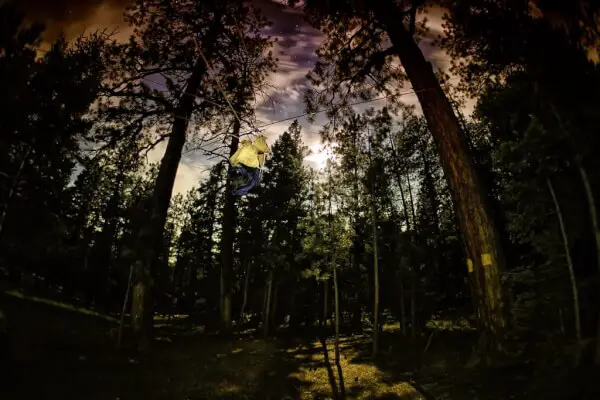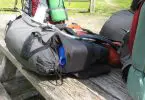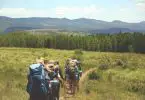The idea of bears entering your campsite is rather daunting, but it is an idea that has to be taken into consideration if you are camping in an area that is known to be home to bears. We all understand that bears do, on certain occasions, enter campsites. But, there are things you can do to minimize the chances of a bear entering your own.
In this article, we are going to show you how to keep bears away from campsite, hopefully for good!
A Process of Elimination
When it comes to the idea of a bear visiting your campsite while you sleep, you need to consider all of the reasons why a bear would want to visit your campsite. You then need to make sure that you remove all of those reasons from your campsite entirely.
The fact of the matter is that if a bear finds anything in your campsite even slightly attractive, it will decide to visit your campsite. Bears are known to have a ridiculously strong sense of smell, a sense that experts know to be at least seven times more powerful than that of a dog.
See also: How to Avoid Wild Animal Attacks: Backpacking Without Unpleasant Events
This means that bears have the ability to detect smells up to a mile away, and bears generally associate the nature of smells with food sources. By eliminating these smells, a bear won’t be inclined to associate your campsite with food.
Remember that bears usually have relatively timid natures, so they are generally expected to keep their distance from humans. But, there are a number of other things that you can take into consideration to ensure that bears are less inclined to visit your campsite during the night, including:
Where do you plan on camping?
The location of your campsite is actually one of the most important things that you need to consider. Firstly, you need to learn how to quickly recognize the signs of bears around the location that you are considering for your campsite. If it looks like bears have frequented the area recently, then you should find another location.
Secondly, you should try to make sure that you choose a camping area that results in the actual sleeping area being upwind from both the food stores and the cooking areas. You should also look around the area and ensure that there are no natural sources of food, including berries.
Bears in the area will be able to find their own natural food sources, so camping near them should be avoided at all costs.
How should you store your food?
Storing your food away from bears is a relatively easy thing to do, once you get the hang of it that is. The first thing that you need to do is find a suitable tree. An ideal tree will have branches that are very high off of the ground, the branches should also be sturdy enough to handle the weight of the food store.

Ideally, your food store should be around 14 feet off of the ground. You also want to make sure that it doesn’t sit too close to the branch that it is hanging on, or the trunk of the tree itself. If it is too close to the branch, squirrels could easily access it. If it is too close to the trunk of the tree, it could fall prey to the claws of climbing bears.
Your food store should be secure. It should contain all of your food and toiletries, and the bag itself should be odor free. This stops the smells from inside of the bag from traveling in the wind, something that could quickly attract nearby bears. For more tips on how to hang a bear bag, check out our article for information.
It should be noted that some guides advise against this method. They believe that bears have grown accustomed to the fact that hanging bags generally equal food, so the bears will try everything that they can to get the hanging bags out of the tree.
Bears are clever animals, so if they have managed to break into a bear hang that is similar to your own, they will use the same method to break into yours. People that believe this generally store their food in odor-free containers that are hidden out of sight on the ground.
If you are using this method, then you need to make sure that the containers are at least several hundred feet away from your actual campsite.
Where should you cook in your campsite?
When you are thinking of the ideal location to cook near your campsite, you really should think on a basis of the further away the better the cooking area will be. You should never do any of your cooking or eating near your actual sleeping area, as the smell from cooking often lingers.
To ensure that the smell of your food does not affect your sleeping area, it would be a good idea to set up your cooking area at least 150 yards away from it. This doesn’t mean that bears should have a free pass to roam your cooking area as they please.
You should make the cooking area itself as unattractive as you possibly can. One way that you can do this is by burying or burning all of your leftovers. Nothing should be left to chance and you should make sure that absolutely everything is disposed of. Remember not to bury your leftovers near your camp or near your source of water.
How clean should you keep your campsite?
Firstly, you should remember that keeping your campsite clean is an important thing to do regardless of whether or not bears could appear. An unclean campsite can attract a huge amount of different pests, ranging from mice to cockroaches.
You should never consider eating near your campsite, all of the eating that you do should be done in your designated cooking area. Anything with a strong smell will attract bears. This doesn’t just mean food either, toiletries like toothpaste are known to have the potential to attract bears. Their noses are also strong enough to sniff out food wrappers, so nothing is truly worth the risk.
You also need to consider the fact that the any clothing that you wear while cooking often ends up smelling like food. This means that you should leave any clothes that you wore while cooking away from your sleeping area, they should never be brought into it.
The best way of managing this is to ensure that you have one set of clothes for cooking and eating, and one set of clothes for sleeping. Try not to get changed near where you cooked, otherwise, your clean clothes will also end up smelling like food.
Another thing to consider is your utensils. If you allow food to linger on them for too long, then the smell will get carried by the wind. Any bears within a mile radius will be able to smell the food, something that is guaranteed to attract them. Deal with this scenario by ensuring that you clean your utensils immediately after you have used them.
Is the type of food that you bring important?
The food that you choose to bring camping with you is actually really important. As humans, we know that certain smells are really strong and recognizable. The way that bears smell food is no different. If your food has a strong and unique smell, like bacon, then it is almost guaranteed to catch the attention of any nearby bears.
Another thing that you need to consider is whether or not you will need to take an effective bear canister camping with you. Several national parks in America actually insist that you have one with you while you go camping, so you should always check the rules before you head out into the backcountry.
The majority of the bear canisters that are currently available on the market will fit directly into the midsection of your backpack. They have been designed specifically so that bears cannot tear them open to access whatever food might be hiding inside, although some bears still manage to break them open with ease.
It is a good idea to store your bear canister at least 300 feet away from your actual campsite. This way, bears that are attracted to the food inside of your bear canister will not come too close to your camping area while you sleep. Another good idea would be to paint your bear canister a bright, noticeable color.
Otherwise, you might not be able to find your bear canister after a bear has been throwing it around trying to get hold of whatever might be inside it.
Is there anything else that you should consider?
One thing that a lot of people like to make jokes about is the use of bear spray. These jokes mostly exist because people do not understand just how good it can be at deterring bears. Scientific research that was done by the University of Calgary actually found that the use of an effective bear spray actually stopped bear attacks in 93% of the cases that they looked at.
What should you do in a worst case scenario?
We can do everything in our power to make sure that bears are not attracted to our campsites, eliminating everything that we can. But, sometimes all of that hard work just isn’t enough. This does not mean that you have to worry about a possible bear encounter, but it does mean that you should know what to do if you are involved in a close up encounter with a bear.
Some people that spend their time camping in the wilderness believe that the use of firearms is the best deterrent when it comes to keeping bears away, but we would never recommend using firearms as a deterrent. The thing about firearms is that things can go wrong quickly.
The use of firearms has the potential to result in a fatal situation, for both people and bears. This means that the decision of whether or not to carry a firearm on a trail is not one that should be taken lightly, as there are other people around that that firearm could easily affect.
You also have to consider that the bear could just be ‘bluff charging’, meaning that it has no intention to actually charge at you. Shooting a bear in that scenario would more than likely result in you wounding the bear and making it angry, turning a relatively safe situation into a dangerous one.
The reality is that expert marksmen struggle to shoot bears in a way that results in a quick death, so no person should ever rely on firearms as a realistic bear deterrent.
There are a number of other things that you can consider to use as a deterrent, like bear spray. Bear spray is incredibly similar to pepper spray, but it contains a completely different set of chemicals. It comes in the form of a canister that can be carried in a holster during the day, it is then advisable to sleep with it next to your pillow during the night.
Bear Behaviour
Knowing a little bit about the way that bears behave can also help you prepare for a rare close encounter. One of the things that you do have to realize is that bears can be incredibly unpredictable animals. These generally timid creatures do occasionally attack humans, usually when they feel threatened.
This can result in serious injuries. Due to this, avoiding a close encounter is usually the best thing that you can actually do. Don’t go out of your way to have an up close and personal experience with a bear.
If you do find yourself in a situation where you are being attacked by a bear, then knowing a little bit about the different species can help. The best thing that you can do if you are attacked by a Brown Bear is to play dead. This sounds a little bit silly, but it works. You should just leave your pack where it is and lay down flat on your stomach, cupping your hands behind the back of your neck for security.
Generally, a Brown Bear will leave if you hold that position for a while. It might try to roll you over first, so you should spread your legs to anchor yourself into that position. If you do have to fight back, then you should use everything at your disposal to hit the bear directly in the face.
An encounter with a Black Bear should be viewed from a different angle. You should never play dead, as a Black Bear won’t simply wander off and leave you alone. Instead, you should try to escape to the closest place of safety. Don’t climb a tree, as bears can climb. Often people try to get to a car, putting a barrier between themselves and the bear.
If escape was not possible during a close encounter with a Black Bear, then you would have to fight back opposed to standing still. Hits should be concentrated around the muzzle of the bear, like punching an attacking shark in the nose.
Again, carrying bear spray is a fantastic option for dealing with any form of bear attack. This spray is used in a purely defensive way, but it is not a repellent. It should be sprayed directly at the bear, not on yourself.
So, how can you keep your campsite safe?
Remember that the easiest way to keep your own campsite safe and bear-free is by using a process of elimination. Eliminate anything and everything that a bear could find attractive, that way, you minimize the chances of a bear paying you and your camping friends a visit during the night.
Make sure that you do all of your cooking away from your campsite, and don’t even think about taking a midnight snack back to your sleeping bag. The weakest of smells traveling in the wind has the potential to attract nearby bears, and you want to avoid that at all costs.
Keep your food store high off of the ground in an odor-proof bag, and far enough away from the trunk of the tree to ensure that a bear cannot simply climb the tree and knock it down. Remember that the squirrels are against you too, and they will break into it if they are given the chance to.
If you are using a bear canister, then paint it a really bright color before you go camping. This will make it a lot easier to spot in the morning, especially if a bear has been trying to break into it during the night. They can end up appearing in the oddest of places! For the best bear canisters, check out our list for more options.
So, how will you bear proof your own campsite? Do you have any little tricks that you use whenever you go camping?








